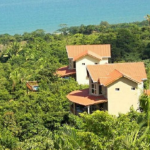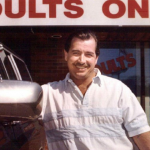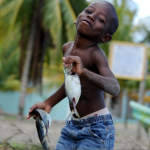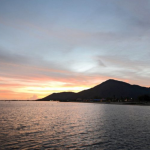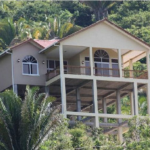The Canadian porn king and the Caribbean paradise
By MARINA JIMENEZ From The Star
Is a businessman taking advantage of lawlessness to scoop up land — or offering Honduras’s Garifuna a way out of poverty?
Randy Jorgensen, a businessman from Saskatchewan who made his fortune in the adult pornography business, is at the centre of a controversy in Honduras over development.
Like many Canadians, Mark Yeoman dreams of leaving behind snow tires, black ice and Highway 401. He dreams of retiring down south.
Instead of Florida or Arizona, though, the businessman has settled on Honduras, an impoverished country with one of the world’s highest homicide rates.
“It is so rustic there. I can get up, eat freshly cut pineapple and jump in the ocean. The people are so friendly and giving,” says Yeoman, who lives in the Greater Toronto Area and works for a company that recycles technology.
Yeoman bought half an acre of land a few years ago for $35,000 (U.S.) on the northern coast in Trujillo in a development called Campa Vista. In three years, when he turns 55, he plans to build a home with a wraparound porch and a swimming pool. Including construction costs, he estimates his piece of beachfront heaven will cost less than $265,000 (Canadian).
Five hundred other Canadians have invested in the development, which includes two sister sites, Alta Vista and Coroz Alta. The Caribbean location couldn’t be better: white-sand beaches, picturesque mountains and two nearby national parks.
As with so many tropical nirvana stories, though, there are dark clouds on the horizon. Behind both the paradise and the storm front is a man once dubbed “Canada’s porn king.”
Randy Jorgensen made a fortune in the last millennium, selling sex when videotape was cutting-edge technology. He then reinvented himself as a land developer and seller of snowbird fantasies. But his Canadian retirement dream is, for indigenous people in Honduras, a nightmare.
The Garifuna say Jorgensen’s developments are on land that was illegally appropriated. They are waging a legal battle to get it back, a battle that has turned ugly. A year ago, a prominent Garifuna activist says he was shot in the torso outside his home — an attack he believes was in retaliation for his efforts to reclaim his people’s land.
In October, a judge barred Jorgensen from leaving the country without the court’s permission.
The affable, ruddy-faced developer says he will respect the court process, but has no intention of giving up his land. His attitude reflects the name of his yacht, which is embroidered on his white golf shirt: Persistence.
Jorgensen seems an unlikely protagonist in a developer-versus-indigenous-rights dispute. The 60-year-old began his career running a muffler shop in his hometown of Moosomin, Sask.
He is soft-spoken and prone to homespun clichés, saying his political views are “so middle of the road I don’t know if I’m blue or red.”
But he is also a shrewd businessman unafraid of controversy.
In the 1990s, he opened a store selling hard-core pornographic films in Saskatoon. Business was so brisk he expanded, creating a national chain of Adults Only Video stores. By 1993, Maclean’s magazine dubbed him “Canada’s porn king.”
That was two years after police had raided AOV stores in 14 Ontario municipalities. They seized copies of films such as La Bimbo, Lawyers in Heat and D-Cup Delights and Jorgensen was eventually convicted of distributing obscene material. He appealed all the way to the Supreme Court of Canada and, in 1995, he won.
By then, he had divorced, and had begun vacationing in Trujillo, a beachside town of 30,000 located between two stunning mountain ranges. Jorgensen bought a house there, and befriended several local business people, including Ramon Lobo, whose brother, Porfirio, would go on to become president.
In 2007, Jorgensen moved to Trujillo permanently. He had sold the AOV business earlier that decade and placed other Canadian business interests in a family trust.
His dream, as he tells it, is to develop tourism in Trujillo. “I see myself as someone who is trying to create an industry that will benefit local residents.”
He says he has sunk $30 million into his company, Life Vision Development, to buy the land, build a cruise ship port called “the Banana Coast” with an oceanfront commercial centre and develop an 80-acre park, complete with a zip line and a zoo. (Life Vision Properties, a company in Mississauga run by Jorgensen’s partner Malik Zachariah, does the direct sales and marketing to Canadians.)
There is only one wrinkle: How did Jorgensen get the land?
The Garifuna — descendants of escaped African slaves and indigenous people who subsist on fishing and farming — have a long history of land struggle. In the 1700s, they were pushed out of the Caribbean country of St. Vincent to Roatan, a Honduran island. From there, they fanned out along the Caribbean coast of Central America.
In the early 1800s, the government of Honduras awarded 2,500 acres of ancestral land to the Garifuna. The community titles state that the collective lands cannot be transferred to an outsider.
In reality, many Garifuna territories suffer from multiple ownership claims. USAID, the American aid agency, found that 80 per cent of privately held land in the country is either untitled or improperly titled.
The Garifuna accuse Jorgensen —and other foreigners with property developments in Honduras — of taking advantage of the corruption and political instability that followed a 2009 coup that ousted then-president Manuel Zelaya, an agrarian reformer. In 2010, Porfirio Lobo was elected president and reversed the land reforms. Three years later, President Juan Orlando Hernandez took office with the slogan: “Honduras is open for business.”
The Organizacion Fraternal Negra de Honduras (OFRANEH) filed a lawsuit on behalf of Rio Negro and Cristales communities in 2011, demanding the Campa Vista land sales to Jorgensen be nullified.
“The collapse of the judicial system after the coup meant there was no due process,” OFRANEH said through a spokesperson.
“The community titles expressly forbid the sale of land to foreigners,” said a spokesperson for the organization’s general co-ordinator, Miriam Miranda. “The habitat of the community is being turned into luxury villas for expatriates. This is not right.”
Jorgensen says he followed all proper legal procedures in purchasing approximately 133 acres of land for Campa Vista, and that he is trying to create a tourism industry in the impoverished country of eight million.
“I have rightful title to the land. In the high season, I employ 250 Garifuna,” he said in an interview. “Most Garifuna agree with the development, but there are some who say the land was never supposed to be sold and was only to be used for the benefit of the community.”
Jorgensen was last in court in Trujillo in November 2015, when a judge found there wasn’t enough evidence to proceed but gave the Garifuna five years to present more evidence.
Two weeks later, a Garifuna activist with the Land Defense Committee, an OFRANEH member, suffered gunshot wounds to his torso outside his house. There is no evidence connecting the attack to Jorgensen, but victim Vidal Leiva told IC Magazine that he believes he was targeted over his efforts to reclaim and defend Garifuna lands.
“Violence and physical force have been constantly used to threaten the livelihood of the Honduran Garifuna communities,” concluded a 2016 report by the Council on Hemispheric Affairs, a Washington, D.C., think-tank.
OFRANEH, in the meantime, appealed the ruling, and in March the court agreed to proceed with the case. However, Jorgensen failed to appear at the May 2 hearing. “I didn’t know I had a court date,” said Jorgensen. “I’m not saying there wasn’t one, only that I didn’t know about it.”
The Garifuna asked the prosecutor to issue an arrest warrant. On Oct. 19, a judge told ordered Jorgensen to remain in Honduras unless he gets court permission to travel.
The one-time porn king acknowledges there are challenges to selling retirement paradise in a troubled country.
He blames his current legal battle on Garifuna infighting. “I held a community meeting to ensure the sale of the land was supported by the members of the Cristales and Rio Negro Community Association, but they have an internal dispute,” he says. “The court case will continue until the association resolves their internal disagreements.”
Most of the Canadians who have invested in the Honduran development are from B.C., Alberta and Saskatchewan. Only about 25 have actually built homes. “They are still speculators,” says Jorgensen. “Trujillo is a low-cost entry into a tropical retirement lifestyle.”
Yeoman isn’t put off by the country’s history of conflict, and is confident that in a few years Honduras will be the next Costa Rica.
“There is a little Canadian enclave down there and that is a good thing,” he says. “I always had it in my head to retire in a tropical paradise and in Honduras my dollar goes three times as far as it does in Canada. Once the economy starts flowing, things will change.”
Timeline
2009
President Manuel Zelaya, who stood for agrarian reform, is ousted in a coup. Honduras is suspended from the Organization of American States.
2010
President Porfirio Lobo is elected president and reverses land reforms. The U.S. and other countries recognize his presidency.
2011
Honduras is declared one of the world’s most dangerous countries, with a homicide rate of 86 per 100,000 people, according to the National Violence Observatory.
2013
Juan Orlando Hernandez is elected president. Violence and corrupt police remain serious issues.
2016
The NGO Global Witness reports that in the last six years 118 environmentalists have been killed in Honduras, many from indigenous communities resisting development projects.
IMAGES:
Randy Jorgensen, a businessman from Saskatchewan who made his fortune in the adult pornography business, is at the centre of a controversy in Honduras over development. (STEVE RUSSELL / TORONTO STAR) | ORDER THIS PHOTO
Dawn at Trujillo, a pretty port on the Caribbean that is home to several developments catering to Canadian expats. (ORLANDO SIERRA/AFP/GETTY IMAGES)
A Garifuna child at a Caribbean beach. The Garifuna are descendants of escaped African slaves and indigenous people who subsist on fishing and farming. (ORLANDO SIERRA/AFP/GETTY IMAGES)
Randy Jorgensen in 1991, four years before the Supreme Court acquitted the adult video store owner of knowingly selling obscene materials. (KITCHENER-WATERLOO RECORD FILE PHOTO)
A home in the Alta Vista property development in Trujillo, Honduras. (LIFE VISION PROPERTIES)
A home in the Alta Vista property development in Trujillo, Honduras, a project launched by Randy Jorgensen. (LIFE VISION PROPERTIES)
For more on this story go to: https://www.thestar.com/news/world/2016/11/20/the-canadian-porn-king-and-the-caribbean-paradise.html


